| Listing 1 - 6 of 6 |
Sort by
|
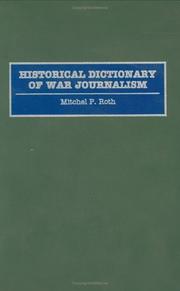
ISBN: 0313291713 9781429476324 142947632X 1567509061 9781567509069 9780313291715 Year: 1997 Publisher: Westport, Conn. : Greenwood Press,
Abstract | Keywords | Export | Availability | Bookmark
 Loading...
Loading...Choose an application
- Reference Manager
- EndNote
- RefWorks (Direct export to RefWorks)
War correspondents --- Correspondants de guerre --- Biography --- Dictionaries --- Biographie --- Dictionnaires anglais --- War in the press --- War --- Correspondents, War --- Journalists --- Reporters and reporting --- Armed conflict (War) --- Conflict, Armed (War) --- Fighting --- Hostilities --- Wars --- International relations --- Military art and science --- Press coverage
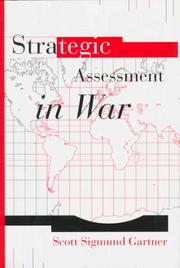
ISBN: 0585346887 9780585346885 9780300160963 0300160968 9780300060348 0300060343 9780300080698 0300080697 Year: 1997 Publisher: New Haven, Conn. Yale University Press
Abstract | Keywords | Export | Availability | Bookmark
 Loading...
Loading...Choose an application
- Reference Manager
- EndNote
- RefWorks (Direct export to RefWorks)
How do military organizations assess strategic policy in war? In this book Scott Gartner develops a theory to explain how military and government leaders evaluate wartime performance, how much they change strategies in response to this evaluation, and why they are frequently at odds when discussing the success or failure of strategic performance.Blending history, decision theory, and mathematical modeling, Gartner argues that military personnel do reevaluate their strategies and that they measure the performance of a strategy through quantitative, "dominant" indicators. But different actors within a government use different indicators of success: some will see the strategy as succeeding when others see it as failing because of their different dominant indicators. Gartner tests his argument with three case studies: the British shift to convoys in World War I following the German imposition of unrestricted submarine warfare; the lack of change in British naval policy in the Battle of the Atlantic following the German introduction of Wolf Packs in World War II; and the American decision to deescalate in Vietnam after the Tet Offensive. He also tests his approach in a nonwar situation, analyzing the Carter Administration's decision to launch the hostage rescue attempt. In each case, his dominant indicator model better predicts the observed behavior than either a standard-organization or an action-reaction approach.
Strategy --- War --- Military & Naval Science --- Law, Politics & Government --- Military Science - General --- Military strategy --- Military art and science --- Military doctrine --- Armed conflict (War) --- Conflict, Armed (War) --- Fighting --- Hostilities --- Wars --- International relations --- Decision making
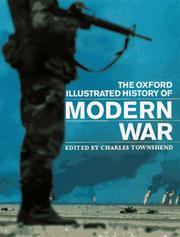
ISBN: 0198204272 Year: 1997 Publisher: Oxford [etc.] : Oxford University Press,
Abstract | Keywords | Export | Availability | Bookmark
 Loading...
Loading...Choose an application
- Reference Manager
- EndNote
- RefWorks (Direct export to RefWorks)
Military art and science
---
-Military history, Modern
---
War
---
-War and society
---
#BIBC:ruil

ISBN: 0813157609 0813170583 9780813170589 0813120209 9780813120201 0813189683 Year: 1997 Publisher: Lexington, Kentucky : The University Press of Kentucky,
Abstract | Keywords | Export | Availability | Bookmark
 Loading...
Loading...Choose an application
- Reference Manager
- EndNote
- RefWorks (Direct export to RefWorks)
The Puritans condemned war profiteering as a ""Provoking Evil,"" George Washington feared that it would ruin the Revolution, and Franklin D. Roosevelt promised many times that he would never permit the rise of another crop of ""war millionaires."" Yet on every occasion that American soldiers and sailors served and sacrificed in the field and on the sea, other Americans cheerfully enhanced their personal wealth by exploiting every opportunity that wartime circumstances presented.In Warhogs, Stuart D. Brandes masterfully blends intellectual, economic, and military history into a fascinating dis
Profiteering --- War --- Anti-profiteering --- Excess profits --- Prices --- Profit --- War, Cost of --- Excess profits tax --- Armed conflict (War) --- Conflict, Armed (War) --- Fighting --- Hostilities --- Wars --- International relations --- Military art and science --- Peace --- History. --- Economic aspects --- #SBIB:012.AANKOOP --- #SBIB:327.5H21 --- #SBIB:328H31 --- #SBIB:97G --- History --- Economic aspects&delete& --- Vrede – oorlog, oorlogssituaties --- Instellingen en beleid: VSA / USA --- Geschiedenis van Noord-Amerika
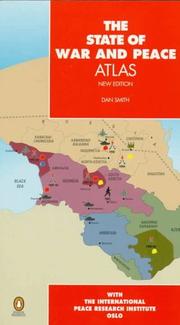
ISBN: 0140513736 0670100072 9780140513738 Year: 1997 Publisher: London Penguin
Abstract | Keywords | Export | Availability | Bookmark
 Loading...
Loading...Choose an application
- Reference Manager
- EndNote
- RefWorks (Direct export to RefWorks)
History --- International relations. Foreign policy --- Polemology --- War --- -Military history, Modern --- -World politics --- -Arms race --- #SBIB:327.5H00 --- #SBIB:327H01 --- #SBIB:03H3 --- #SBIB:AANKOOP --- 327.5 --- Arms proliferation --- Proliferation of arms --- Security, International --- Arms control --- Arms transfers --- Disarmament --- Military readiness --- Colonialism --- Global politics --- International politics --- Political history --- Political science --- World history --- Eastern question --- Geopolitics --- International organization --- International relations --- Modern military history --- Armed conflict (War) --- Conflict, Armed (War) --- Fighting --- Hostilities --- Wars --- Military art and science --- Peace --- Maps --- Strategie en vredesonderzoek: algemeen --- Internationale betrekkingen: encyclopedieën, woordenboeken, atlassen --- Atlassen --- Military history, Modern --- Conflict management. --- World politics, 1989 --- -International police. --- Peace. --- Maps. --- PeaceMaps --- World politics, 1989-. --- International police.
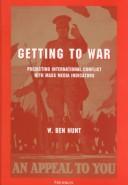
ISBN: 0472107518 9786612604904 0472026488 1282604902 9780472026487 9780472107513 9781282604902 6612604905 Year: 1997 Publisher: Ann Arbor, Mich. University of Michigan Press
Abstract | Keywords | Export | Availability | Bookmark
 Loading...
Loading...Choose an application
- Reference Manager
- EndNote
- RefWorks (Direct export to RefWorks)
Shows how we can predict the start of wars by measuring government efforts to secure public support.
Polemology --- Mass communications --- Guerre et médias --- Indicateurs politiques --- Mass media and war --- Mass média dans la guerre --- Mass média et guerre --- Massamedia en oorlog --- Massamedia in de oorlog --- Médias et guerre --- Médias et guerres --- Political indicators --- Politieke indicatoren --- War in mass media --- War --- -War in mass media --- #SBIB:327.5H21 --- #SBIB:309H1016 --- #SBIB:309H271 --- #SBIB:AANKOOP --- Mass media --- Armed conflict (War) --- Conflict, Armed (War) --- Fighting --- Hostilities --- Wars --- International relations --- Military art and science --- Peace --- Indicators, Political --- Political statistics --- War and mass media --- Forecasting --- Vrede – oorlog, oorlogssituaties --- Media: socio-culturele aspecten (massamedia en maatschappij, met inbegrip van cultuurhistorische werken en werken over de maatschappelijke en politieke effecten van de (diverse) media) --- Politieke communicatie: toepassingsgebieden --- BUSINESS & ECONOMICS --- Business Ethics --- Military Science - General --- Military & Naval Science --- Law, Politics & Government --- Mass media and war. --- Political indicators. --- War in mass media. --- Forecasting. --- War - Forecasting.
| Listing 1 - 6 of 6 |
Sort by
|

 Search
Search Feedback
Feedback About UniCat
About UniCat  Help
Help News
News